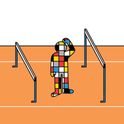Despite high-profile success stories like Deep Blue's chess victory over Garry Kasparov in 1997, the artificial intelligence project has been a tale of failure ever since its inception in the 1950s, at least when judged by the high standards that AI pioneers set themselves in the early years: witness Marvin Minsky's famous declaration, in 1967, that "Within a generation… the problem of creating 'artificial intelligence' will substantially be solved." (The field has had much more success in creating "domain-specific" intelligences, of which Deep Blue can be seen as an example, and has also contributed greatly to the revival of mind and consciousness as central philosophical concerns.) A fascinating article in Wired tells the tragic story of two young AI pioneers who during the 1990s and 2000s attempted to kick some life back into the ailing field. In 1996, a young researcher named Pushpinder Singh (who happened to be working under Minsky) published a paper called "Why AI Failed,"which called for a return to the integrated approach to building intelligence that had driven the field in its early years, and away from piecemeal, domain-specific research. Bill Gates, among others, commented approvingly on the essay. Singh went on to create "Open Mind Common Sense," his attempt to harness open-source methodology to build a huge database of "commonsense" propositions that could be used as the foundation of a new form of artificial intelligence. Singh was set to be appointed a professor at MIT to move the project on—but early in 2006 committed suicide. Four weeks earlier, the disturbed maverick Chris McKinstry, the second subject of the Wired piece, had also killed himself. McKinstry, an outsider who had a history of mental illness and suicide attempts, was behind an AI project called Mindpixel which used a similar approach to Open Mind Common Sense. Spurned by the academic establishment and a laughing stock for many in the online community, McKinstry had nevertheless proved himself a serious and original contributor to the AI field, and his project eventually garnered 1.5m submissions.













